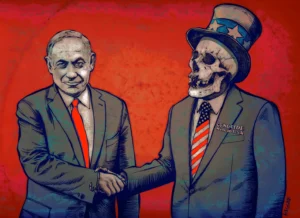Thou Shalt Not Commit Genocide
IN FOCUS, 19 Aug 2024
The Chris Hedges Report – TRANSCEND Media Service
Opposing genocide is a moral not a political choice.
16 Aug 2023 – There is only one way to end the ongoing genocide in Gaza. It is not through bilateral negotiations. Israel has amply demonstrated, including with the assassination of the lead Hamas negotiator, Ismail Haniyeh, that it has no interest in a permanent ceasefire. The only way for Israel’s genocide of the Palestinians to be halted is for the U.S. to end all weapons shipments to Israel. And the only way this will take place is if enough Americans make clear they have no intention of supporting any presidential ticket or any political party that fuels this genocide.
The arguments against a boycott of the two ruling parties are familiar: It will ensure the election of Donald Trump. Kamala Harris has rhetorically shown more compassion than Joe Biden. There are not enough of us to have an impact. We can work within the Democratic Party. The Israel lobby, especially the American Israel Public Affairs Committee (AIPAC), which owns most members of Congress, is too powerful. Negotiations will eventually achieve a cessation of the slaughter.
In short, we are impotent and must surrender our agency to sustain a project of mass killing. We must accept as normal governance the shipment of hundreds of millions of dollars in military aid to an apartheid state, the use of vetoes at the U.N. Security Council to protect Israel and the active obstruction of international efforts to end mass murder. We have no choice.
Genocide, the internationally recognized crime of crimes, is not a policy issue. It cannot be equated with trade deals, infrastructure bills, charter schools or immigration. It is a moral issue. It is about the eradication of a people. Any surrender to genocide condemns us as a nation and as a species. It plunges the global society one step closer to barbarity. It eviscerates the rule of law and mocks every fundamental value we claim to honor. It is in a category by itself. And to not, with every fiber of our being, combat genocide is to be complicit in what Hannah Arendt defines as “radical evil,” the evil where human beings, as human beings, are rendered superfluous.
The plethora of Holocaust studies should have made this indelible point. But Holocaust studies were hijacked by Zionists. They insist that the Holocaust is unique, that it is somehow set apart from human nature and human history. Jews are deified as eternal victims of anti-Semitism. Nazis are endowed with a special kind of inhumanity. Israel, as the U.S. Holocaust Memorial Museum in Washington concludes, is the solution. The Holocaust was one of several genocides carried out in the 19th and 20th centuries. But historical context is ignored and with it our understanding of the dynamics of mass extermination.
The fundamental lesson of the Holocaust, which writers such as Primo Levi stress, is that we can all become willing executioners. It takes very little. We can all become complicit, if only through indifference and apathy, in evil.
“Monsters exist,” Levi, who survived Auschwitz, writes, “but they are too few in number to be truly dangerous. More dangerous are the common men, the functionaries ready to believe and to act without asking questions.”
To confront evil — even if there is no chance of success — keeps alive our humanity and dignity. It allows us, as Vaclav Havel writes in “The Power of the Powerless,” to live in truth, a truth the powerful do not want spoken and seek to suppress. It provides a guiding light to those who come after us. It tells the victims they are not alone. It is “humanity’s revolt against an enforced position” and an “attempt to regain control over one’s sense of responsibility.”
What does it say about us if we accept a world where we arm and fund a nation that kills and wounds hundreds of innocents a day?
What does it say about us if we support an orchestrated famine and the poisoning of the water supply where the polio virus has been detected, meaning tens of thousands will get sick and many will die?
What does it say about us if we permit for 10 months the bombing of refugee camps, hospitals, villages and cities to wipe out families and force survivors to camp out in the open or find shelter in crude tents?
What does it say about us when we accept the murder of 16,456 children, although this is surely an undercount?
What does it say about us when we watch Israel escalate attacks on United Nations facilities, schools — including the Al-Tabaeen school in Gaza City, where over 100 Palestinians were killed while performing the Fajr, or dawn prayers — and other emergency shelters?
What does it say about us when we permit Israel to use Palestinians as human shields by forcing handcuffed civilians, including children and the elderly, to enter potentially booby-trapped tunnels and buildings in advance of Israeli troops, at times dressed in Israeli military uniforms?
What does it say about us when we support politicians and soldiers who defend the rape and torture of prisoners?
Are these the kinds of allies we want to empower? Is this behavior we want to embrace? What message does this send to the rest of the world?
If we do not hold fast to moral imperatives, we are doomed. Evil will triumph. It means there is no right and wrong. It means anything, including mass murder, is permissible. Protestors outside the Democratic National Convention at the United Center in Chicago demand an end to the genocide and U.S. aid to Israel, but inside we are fed a sickening conformity. Hope lies in the streets.
A moral stance always has a cost. If there is no cost, it is not moral. It is merely conventional belief.
“But what of the price of peace?” the radical Catholic priest Daniel Berrigan, who was sent to federal prison for burning draft records during the war in Vietnam, asks in his book “No Bars to Manhood:”
I think of the good, decent, peace-loving people I have known by the thousands, and I wonder. How many of them are so afflicted with the wasting disease of normalcy that, even as they declare for the peace, their hands reach out with an instinctive spasm in the direction of their comforts, their home, their security, their income, their future, their plans — that five-year plan of studies, that ten-year plan of professional status, that twenty-year plan of family growth and unity, that fifty-year plan of decent life and honorable natural demise. “Of course, let us have the peace,” we cry, “but at the same time let us have normalcy, let us lose nothing, let our lives stand intact, let us know neither prison nor ill repute nor disruption of ties.” And because we must encompass this and protect that, and because at all costs — at all costs — our hopes must march on schedule, and because it is unheard of that in the name of peace a sword should fall, disjoining that fine and cunning web that our lives have woven, because it is unheard of that good men should suffer injustice or families be sundered or good repute be lost — because of this we cry peace and cry peace, and there is no peace. There is no peace because there are no peacemakers. There are no makers of peace because the making of peace is at least as costly as the making of war — at least as exigent, at least as disruptive, at least as liable to bring disgrace and prison and death in its wake.
The question is not whether resistance is practical. It is whether resistance is right. We are enjoined to love our neighbor, not our tribe. We must have faith that the good draws to it the good, even if the empirical evidence around us is bleak. The good is always embodied in action. It must be seen. It does not matter if the wider society is censorious. We are called to defy — through acts of civil disobedience and noncompliance — the laws of the state, when these laws, as they often do, conflict with moral law. We must stand, no matter the cost, with the crucified of the earth. If we fail to take this stand, whether against the abuses of militarized police, the inhumanity of our vast prison system or the genocide in Gaza, we become the crucifiers.
______________________________________________
 Chris Hedges is a Pulitzer Prize–winning journalist who was a foreign correspondent for fifteen years for The New York Times, where he served as the Middle East Bureau Chief and Balkan Bureau Chief. He previously worked overseas for The Dallas Morning News, The Christian Science Monitor, and NPR. He used to be the host of the Emmy Award-nominated RT America show On Contact.
Chris Hedges is a Pulitzer Prize–winning journalist who was a foreign correspondent for fifteen years for The New York Times, where he served as the Middle East Bureau Chief and Balkan Bureau Chief. He previously worked overseas for The Dallas Morning News, The Christian Science Monitor, and NPR. He used to be the host of the Emmy Award-nominated RT America show On Contact.
Copyright 2024 Chris Hedges
Go to Original – chrishedges.substack.com
Join the BDS-BOYCOTT, DIVESTMENT, SANCTIONS campaign to protest the Israeli barbaric siege of Gaza, illegal occupation of the Palestine nation’s territory, the apartheid wall, its inhuman and degrading treatment of the Palestinian people, and the more than 7,000 Palestinian men, women, elderly and children arbitrarily locked up in Israeli prisons.
DON’T BUY PRODUCTS WHOSE BARCODE STARTS WITH 729, which indicates that it is produced in Israel. DO YOUR PART! MAKE A DIFFERENCE!
7 2 9: BOYCOTT FOR JUSTICE!
Tags: Gaza, Genocide, Israel, Palestine, USA
DISCLAIMER: The statements, views and opinions expressed in pieces republished here are solely those of the authors and do not necessarily represent those of TMS. In accordance with title 17 U.S.C. section 107, this material is distributed without profit to those who have expressed a prior interest in receiving the included information for research and educational purposes. TMS has no affiliation whatsoever with the originator of this article nor is TMS endorsed or sponsored by the originator. “GO TO ORIGINAL” links are provided as a convenience to our readers and allow for verification of authenticity. However, as originating pages are often updated by their originating host sites, the versions posted may not match the versions our readers view when clicking the “GO TO ORIGINAL” links. This site contains copyrighted material the use of which has not always been specifically authorized by the copyright owner. We are making such material available in our efforts to advance understanding of environmental, political, human rights, economic, democracy, scientific, and social justice issues, etc. We believe this constitutes a ‘fair use’ of any such copyrighted material as provided for in section 107 of the US Copyright Law. In accordance with Title 17 U.S.C. Section 107, the material on this site is distributed without profit to those who have expressed a prior interest in receiving the included information for research and educational purposes. For more information go to: http://www.law.cornell.edu/uscode/17/107.shtml. If you wish to use copyrighted material from this site for purposes of your own that go beyond ‘fair use’, you must obtain permission from the copyright owner.
Join the discussion!
We welcome debate and dissent, but personal — ad hominem — attacks (on authors, other users or any individual), abuse and defamatory language will not be tolerated. Nor will we tolerate attempts to deliberately disrupt discussions. We aim to maintain an inviting space to focus on intelligent interactions and debates.
